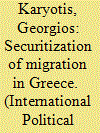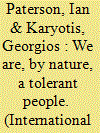|
|
|
Sort Order |
|
|
|
Items / Page
|
|
|
|
|
|
|
| Srl | Item |
| 1 |
ID:
093600


|
|
|
|
|
| Publication |
2010.
|
| Summary/Abstract |
This article revisits securitization theory of the Copenhagen School by addressing an empirical overemphasis on political actors and offering a quantitative extension to typically qualitative assessments of the theory. Using Greece as a case study, it explores the dynamics of competition and the relative discursive power of two actors, political and religious elites, regarding migration. After first documenting a divergence in the two actors' rhetoric through discourse analysis, it proceeds to measure the relative impact of their discourses on public immigration attitudes, employing structural equation modelling of European Social Survey data. Findings demonstrate that exposure to the securitizing religious discourse through church attendance immunizes citizens from the softening effect of the political message. This, in turn, explains the survival of the security frame on migration in Greece, even as political elites begin to move towards the desecuritized pole of the continuum. Crucially, the analysis of this case suggests that a methodological synthesis of qualitative and quantitative research methods to study securitization is possible despite limitations. The authors call for greater efforts to combine the two methods which would allow for a better understanding of securitization and desecuritization processes.
|
|
|
|
|
|
|
|
|
|
|
|
|
|
|
|
| 2 |
ID:
078780


|
|
|
|
|
| Publication |
2007.
|
| Summary/Abstract |
After 27 years of stalemate and inability to make any progress in dealing with domestic terrorism, in 2002 the Greek police finally arrested members of the `Revolutionary Organization November 17', the most lethal terrorist group ever to operate in Greece. The arrest of the terrorists raised several questions that have not yet been satisfactorily answered. Why did Greece take so long before a decisive strike against domestic, left-wing terrorism was recorded? What were the factors that led to the arrest of the terrorists? In answering these questions it is necessary to analyse not just the operational changes in the Greek counter-terrorist strategy that began to materialize at the turn of the millennium, but also the deep-rooted conceptual changes that led to the inclusion of terrorism in the Greek security agenda for the first time. I utilize and extend the theory of `securitization' as developed by the Copenhagen school, and argue that the state's failure to curtail terrorist activity in Greece resulted from the erroneous belief that terrorism was not a direct threat to Greek security. In turn, the belated securitization of terrorism was the key to the arrest of the terrorists that held Greece hostage for almost three decades
|
|
|
|
|
|
|
|
|
|
|
|
|
|
|
|
| 3 |
ID:
130912


|
|
|
|
|
| Publication |
2012.
|
| Summary/Abstract |
The field of security is largely controlled by elites who, by virtue of their authority, are able to create an image of an enemy which is largely independent of the objective significance of a threat. However, a narrow focus on speech acts and discourse analysis to study such processes of securitization is inherently inadequate. This article provides a panoramic account of Greek migration politics during the 1990s. It shows that securitization can be discursive or nondiscursive, pre-mediated or subconscious, and beneficial or detrimental for securitizing actors. Elite interviews and an in-depth analysis of contextual factors help make sense of these dynamics
|
|
|
|
|
|
|
|
|
|
|
|
|
|
|
|
| 4 |
ID:
184049


|
|
|
|
|
| Summary/Abstract |
The ‘securitisation’ of migration is argued to rest on a process of framing migrants as a threat to key values, principally identity. Yet, the socially constructed nature of ‘identity’ implies the potential for dual usage: support and contestation of the security frame. Using the UK as an illustrative case, this overlooked dynamic is explored through mixed-methods, incorporating elite political and religious discourse (2005–2015) and original public attitudinal survey evidence. The discourse analysis reveals that the preservation of an imperilled British identity (‘tolerance’) is a frame invoked, in different ways and by different actors, to either support or contest the securitisation of migration. Similarly, British citizens who deeply value the preservation of ‘Britishness’ have diverse, positive and negative views on migration, challenging the notion that identity as a referent object is deterministically linked to anti-immigration attitudes. The innovative concept of ‘counter-securitisation’ is utilised and developed, unpicking these nuances and their implications.
|
|
|
|
|
|
|
|
|
|
|
|
|
|
|
|
|
|
|
|
|